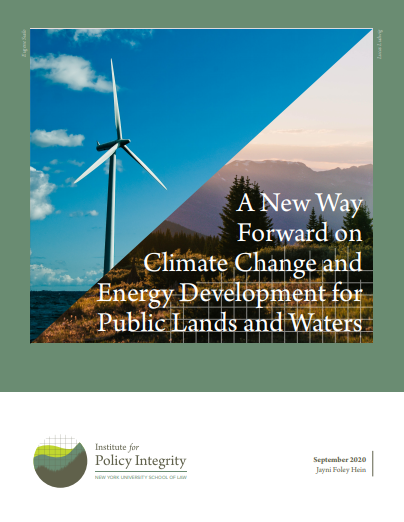-
Department of Interior Delays, Reassesses Trump-Era Rule on Fossil Fuel Royalty Rates
The Department of Interior delayed the effective date of a Trump-era rule that lowers the royalty burden on corporations extracting fossil fuels on public lands. We provided significant input on the review of the rule, helping guide ONRR’s decision to delay the rule and further examine its legality and impact.
-
Comments on Interior’s Review of Oil and Gas Program
The Department of the Interior is conducting a review of its federal oil and gas leasing program. We submitted comments encouraging the Interior to pursue concurrent action on three fronts.
-
Comments to ONRR on Royalty Rates for Oil and Gas Leasing
A new rulemaking by the Office of Natural Resources Revenue (ONRR) delays the effective date of its previously-finalized Valuation Reform and Civil Penalty Rule and seeks input on several questions. We submitted comments focusing primarily on a question about the role of climate impacts in setting royalty policy.
-
Amicus Brief in D.C. Circuit on Methane Limits for Oil and Gas Sector
The Environmental Protection Agency (EPA) recently finalized revisions to New Source Performance Standards for methane and volatile organic compound (VOC) emissions from the oil and natural gas sector. We filed an amicus brief in the U.S. Court of Appeals for the D.C. Circuit, focusing on EPA's flawed legal and economic justifications for the rule.
-
Amicus Brief in Ninth Circuit on Montana Coal Mine Expansion
The expansion of the Bull Mountains Mine project in Montana would allow for an increase in coal production likely resulting in more than $9 billion in climate damages. We filed an amicus brief in the U.S. Court of Appeals for the Ninth Circuit criticizing the Office of Surface Mining’s analysis of the project, which fails to monetize climate impacts using the social cost of carbon. We explain that the project’s full economic benefit is, at most, just one-third of its expected climate costs.
-
Presidential Transition Guidance
As the presidential transition begins, the Institute for Policy Integrity has outlined recommended policy priorities for the Biden administration on climate, energy, and environmental policy, and related social equity outcomes. It is crucial that the incoming administration undertake aggressive reforms that are grounded in science and economics. In recent months, we published a series of reports highlighting actionable, near- and medium-term policy recommendations in several key areas.
-
Comments to FERC on Iroquois Project
The Federal Energy Regulatory Commission’s (FERC) environmental assessment for the Iroquois Gas Transmission System’s Enhancement by Compression Project -- which calls for four natural-gas compressor stations in New York -- fails to estimate the project's downstream or upstream greenhouse gas emissions, and falsely suggests that the project may fully substitute for other sources of fossil-fuel energy. We submitted comments calling on FERC to quantify and monetize greenhouse gas emissions, and rebutting the suggestion that the project will not increase total emissions.
-
Comments on Climate Damages from Farmington Mancos-Gallup RMP
The Bureau of Land Management and the Bureau of Indian Affairs forecast that resource management in New Mexico's Farmington Mancos-Gallup region would produce more than 300 million metric tons of cumulative greenhouse gas emissions under their preferred alternative. Our joint comments explain that the agencies should better evaluate the proposal's climate impacts using the social cost of greenhouse gases. We also submitted comments focused on the agencies' obligation to conduct environmental justice analysis under Executive Order 12,898.
-
A New Way Forward on Climate Change and Energy Development for Public Lands and Waters
The Department of the Interior has yet to develop a comprehensive plan to accurately account for, manage, and mitigate the greenhouse gas emissions that result from the extraction and combustion of fossil fuels from public lands and waters. This document describes immediate and longer-term actions that Interior’s Bureau of Land Management and Bureau of Ocean Energy Management should take to reform public lands management consistent with climate change, conservation, and fiscal reform priorities.
Viewing recent projects in Natural Resources








